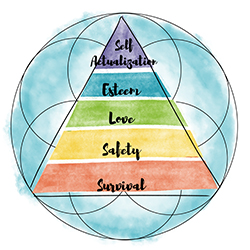
Self-Actualization
Realizing Full Potential & Finding Meaning
Balance in the highest tier of Maslow's Hierarchy involves striving for personal growth, self-fulfillment, and a deep connection to life's meaning and purpose. It's an ongoing journey of self-discovery and self-actualization that can lead to a sense of fulfillment, contentment, and inner peace. Balancing this tier is about aligning your life with your core values and aspirations while contributing positively to the world around you.
While spirituality isn’t a formal tier in Maslow’s model, many people find the two intertwine. Self-actualization often leads us inward—to deeper questions about meaning, connection, and the nature of self. Whether explored through creativity, mindfulness, purpose-driven work, or spiritual practice, this tier represents the desire to live a life that feels truly ours.
Core-concepts
Tier 5
At the pinnacle of the hierarchy are self-actualization needs:
- Self-Actualization: Fulfilling one's potential, pursuing personal growth, creativity, and self-discovery.
- Autonomy: The ability to make independent choices and decisions.
Self-Actualization Needs
 Questions
Questions
- Am I pursuing my passions and fulfilling my potential?
- Do I have a clear sense of purpose and meaning in life?
- How can I continue to grow, learn, and evolve as an individual?
Write the ways you practice and fulfill your self-actualization needs.
Login to view.

Actions

Resources
 Define
Define
Self-Actualization
- Refers to the process of becoming the best version of oneself, realizing one's full potential, and achieving personal growth and fulfillment.
- Self-actualization involves a strong focus on personal development, creativity, authenticity, and the pursuit of one's unique talents and passions.
- It is often associated with characteristics such as self-awareness, self-acceptance, autonomy, and the ability to make choices aligned with one's values and aspirations.
- While self-actualization can include spiritual growth for some individuals, it is not limited to religious or metaphysical experiences and can be pursued in secular contexts as well.
Spirituality
- Spirituality is a broad and multifaceted concept that pertains to a person's connection with the transcendent or divine, often within a religious or philosophical framework.
- It involves seeking a deeper understanding of the meaning and purpose of life, as well as exploring questions related to existence, morality, and the nature of reality.
- Spirituality can be expressed through religious practices, meditation, prayer, mindfulness, and other forms of inner exploration.
- It often involves a sense of interconnectedness with the universe, a higher power, or a divine presence.
- Spirituality can be deeply personal and subjective, with individuals having varying beliefs and experiences.
Psyche
Psyche (noun): the human soul, mind, or spirit.
It includes the ego, inner self, persona, subconscious, and true being. Each part plays a role in how we perceive, feel, and act.
 Read
Read
Spiritual Actualization
Written by Fractal.org
Spiritual means pertaining to the spirit, just as mental pertains to the mind. Where today, the mind is getting the job previously assigned to the soul, the latter is now taking on its original meaning as the seat of the spirit.
While most people have a reasonable grasp of what is meant by mind, many may argue about what is meant by soul or spirit. Psychologists have come up with many words such as ego, id, self, consciousness, sub-conscious, all trying to express different aspects of our inner self. When I talk about 'spirit' I mean that aspect of us with which we identify as 'I', that what thinks, feels, and speaks, when we do so. More importantly, it is that what drives us to action, i.e. that what makes us actualize, express our 'selves'.
Our spirit has a 'will' to live, to act, to do, to make things happen. It has an 'attitude'. It is 'happy', regardless the circumstances. It is, so to speak, free from body, emotions, and mind. It is as if, when we are born, we are encapsulated in this tiny little body, that we have to train to make it serve us in our quest. That quest is in our spirit. The body we were born with, our circumstances, our environment all make up our karma. It is the task of our spirit to match our quest with our karma, so they work harmoniously together, instead of throwing us into confusion, fear, and anger.
There is only one problem: What is our 'quest'? It takes all our life to find out 'who' we are, to 'know ourselves', to find out 'what we are to do', 'what we came for on this earth', i.e. 'what our quest is'. Our spirit knows the quest, but cannot put it in words. It puts it in inner voices, feelings, desires, wants, sensations of comfort and discomfort, happiness, uneasiness, attitude.
What do we make of our life and how we look for self actualization depends on how we permit our spirit to speak up. Also, on how we listen, how we let it guide us, on how open we are to its quest. We are driven by our spirit to act, to develop ourselves, to learn. Inaction, in contrast, is paralysis, which leads to stagnation, to waste the time we have in our life to accomplish our task.
Learning about spiritual development is a mental exercise, done by contemplation. But applying it is spiritual actualization. The latter is done by meditation. Meditation can done in many different ways. Essential in each method is to bring the mind to a state of quietness, emptiness, so we can listen to our spirit, and find out about our quest and its relation to our karma.
"Balony", I can hear some say: "you are the product of your inherited traits, and your environment, what you take for your spirit is nothing else than the sub-conscious residue of your mind's notions." "What drives you is what you have programmed your mind for, in earlier stages of your life." And I will agree that often that is what drives us, what motivates us, what makes us act, most of the time.
'Mental hygiene' is the exercise of cleansing the mind from old and especially detrimental programs. Positive thinking is the exercise of removing negative thoughts that have been programmed in at various times in our life. We can reprogram ourselves to operate in a more agreeable way. So what is the difference between the program in your mind and your spirit? Is spirit that what guides us in developing our own new and improved program?
Again, only meditation can tell, which brings us to our next topic."
Understanding Self with Different Perspectives
 Question
Question
- What tools or practices can help me achieve a greater understanding and balance of myself?
- How can these tools assist me in gaining a deeper understanding of myself and the world around me?
- Do I find myself acting from ego or my true self on a regular basis?
- Do I have access to tools that can aid in better understanding myself and the universe I live in?
 Practice
Practice
There are many paths to understanding your inner world. You don’t need to follow all of them—just explore what resonates.
Energetic & Symbolic Tools
- Astrology :Get your natal chart, explore current transits, and observe patterns.
- Chakra Work: Balance your energy centers with meditation, movement, or sound.
- Tarot Cards: Use symbolism to tap into your intuition.
- Psychic Senses: Explore intuitive gifts like clairvoyance or clairsentience.
Scientific & Philosophical Perspectives
- Quantum Physics – Reflect on how perception shapes your reality.
- Metaphysics – Contemplate universal consciousness and existence.
- Emotional Intelligence (EQ) – Improve how you understand and regulate your emotions.
Mindset & Manifestation
- Law of Attraction – Practice focusing your attention and intention.
- Visualization & Journaling – Use writing and imagery to clarify your inner world.
Ultimately, the goal is to find the tools and practices that resonate with you and support your personal growth and self-discovery journey. These resources can offer insights and inspiration, but your unique experience and perspective are what truly define your path to self-understanding and balance.
 Specific Tools
Specific Tools
Astrology
- Free In-depth Natal Chart from Cafe Astrology
- Monthly Horoscopes with Kelley Rosano
- Weekly & Monthly Horoscopes with Nadiyah Shah
The 7 Chakras
- How to Open Your Spiritual Chakras
- 7 Ways to Spring Clean Your Chakras
- Chakra Cleansing & Activating Guided Meditation
Metaphysics
Quantum Physics
The Law of Attraction
Tarot Cards
The 6 Psychic Senses
The 5 Emotional Intelligences
All The Above




 Questions
Questions Define
Define Read
Read Practice
Practice Specific Tools
Specific Tools